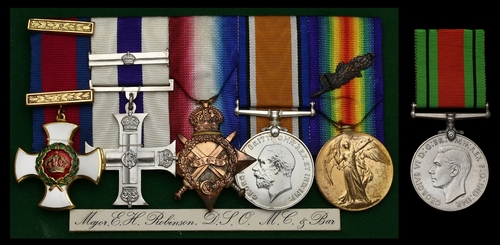
Auction: 25002 - Orders, Decorations and Medals
Lot: 126
The outstanding Great War D.S.O., M.C. and Bar group of six awarded to Lieutenant-Colonel E. H. 'Robin' Robinson, 7th King's Shropshire Light Infantry, who was thrice wounded on the Western Front
'A man endowed with abundant courage' and 'a grand fighter', he won his first M.C. at St. Eloi in April 1916, when he was wounded by a machine-gun fire but continued to man a Lewis gun until it was knocked out. And in similar vein he added a second M.C. and a D.S.O. to his accolades, when his stoic leadership turned the tide of battle
He was not averse to innovation - on one memorable occasion on the Arras front in April 1917, he and his party carried out a successful trench raid dressed in white sheets and ladies' nightgowns, the whole purchased at Arras by way of winter camouflage; having then gathered up their sheets and gowns, they returned in triumph to our lines with a startled German prisoner
Robinson subsequently proved to be a tour de force as the long-served headmaster of Moseley Grammar School 1923-55, but couldn't resist returning to uniform as a senior officer in the Brimingham Home Guard 1940-44
Distinguished Service Order, G.V.R., silver-gilt and enamel; Military Cross, G.V.R., with Second Award Bar; 1914-15 Star (2 Lieut. E. H. Robinson, Shrops. L.I.); British War and Victory Medals, with M.I.D. oak leaves (Major E. H. Robinson); Defence Medal 1939-45, generally good very fine (6)
Provenance:
March Medals, July 1986.
D.S.O. London Gazette 6 April 1918, the original citation states:
'For conspicuous gallantry and devotion to duty. He led his company in an attack until further advance was impossible. He then re-organised them, and collecting all men available of other companies, successfully repelled two counter-attacks, although the troops on either flank fell back. His skilful leadership and resolute bearing were a magnificent example to the remainder of the battalion.'
M.C. London Gazette 1 January 1917.
Bar to M.C. London Gazette 18 July 1917, the original citation states:
'For conspicuous gallantry and devotion to duty. Finding the battalion was held up, he immediately organised bombing parties to clear up the objective. When this was found impossible, he was of the utmost assistance in re-organising not only his own company but the remainder of the battalion. His splendid example largely contributed to the success of the operations.'
Ernest Harold Robinson was born at Newport, Salop on 12 January 1890 and was educated at Newport Grammar School and at St. John's College, Cambridge. Opting for a career as a teacher, he was working as an assistant master at Magnus Grammar School in Newton-on-Trent on the outbreak of hostilities in August 1914.
Commissioned in the 7th Battalion, King's Shropshire Light Infantry in November 1914, he was embarked for France as the battalion's Machine Gun Officer in September 1915, in which capacity he quickly saw action in the Ypres salient.
His subsequent M.C.-winning exploits came to pass at St. Eloi in April 1916, when he stayed behind to hold a mine crater as his battalion moved out of the line. Two of his Lewis gun team were killed beside him but he refused to leave, even when wounded, and it was only when the gun was knocked out by shellfire that he eventually withdrew. His wounds - 'lacerated shell wounds to his right leg and thigh' - necessitated his evacuation.
Advanced to Temporary Captain in September 1916, he rejoined his battalion in the same month and was quickly in action in the closing stages of the Somme offensive in November. On the 12th, the battalion moved forward to launch an attack on Serre. It was a hopeless endeavour, enacted in deep mud, and at a cost of over 200 casualties.
Robinson emerged unscathed and next gained his seniors approbation in a trench raid in the Arras sector on 3 April 1917. The regimental history takes up the story:
'On April 3rd a very successful little raid captured a most useful prisoner without suffering any casualty. The party was led by Lieutenant Robinson and Sergeant Palmer, and they were all dressed in sheets and ladies' nightgowns purchased in Arras, as the ground was covered in snow. The prisoner belonged to a Division recently returned from the Russian front, and his information proved of considerable value.'
But it was likely in the battle of Arras later that month that Robinson won his second M.C., the battalion carrying out a major assault against 'Chapel Hill' on the 9th; so, too, against the Bois des Vert on 2 May. And he subsequently added the D.S.O. to his accolades, most probably for his part in the battalion's attack against Zonneberg in late September. He was also mentioned in despatches (London Gazette 21 December 1917, refers) and, in early January 1918, was appointed temporary Battalion C.O.
Then came the great storm, the outset of the German Spring Offensive in late March 1918, in which the battalion suffered extensive casualties. And among them was Robinson, who was wounded in the right foot by a machine-gun bullet at Locon, Belgium on 12 April 1918. The serious nature of his wound necessitated his evacuation.
Having then rejoined the battalion in the summer, he was yet again wounded, this time in both arms and his forehead in the advance on Rumilly on 2 October 1918. Thus ended his gallant military career.
Back home, Robinson returned to his teaching post at Magnus Grammar School and was appointment Headmaster of Moseley Grammar School, Birmingham in 1923. He was to occupy that post until 1955, in addition to serving as a Lieutenant-Colonel in the city's Home Guard in 1940-44.
He died at Chipping Norton, Oxfordshire in 1968, aged 78; sold with extensive copied research.
Subject to 20% VAT on Buyer’s Premium. For more information please view Terms and Conditions for Buyers.
Sold for
£5,800
Starting price
£1900




